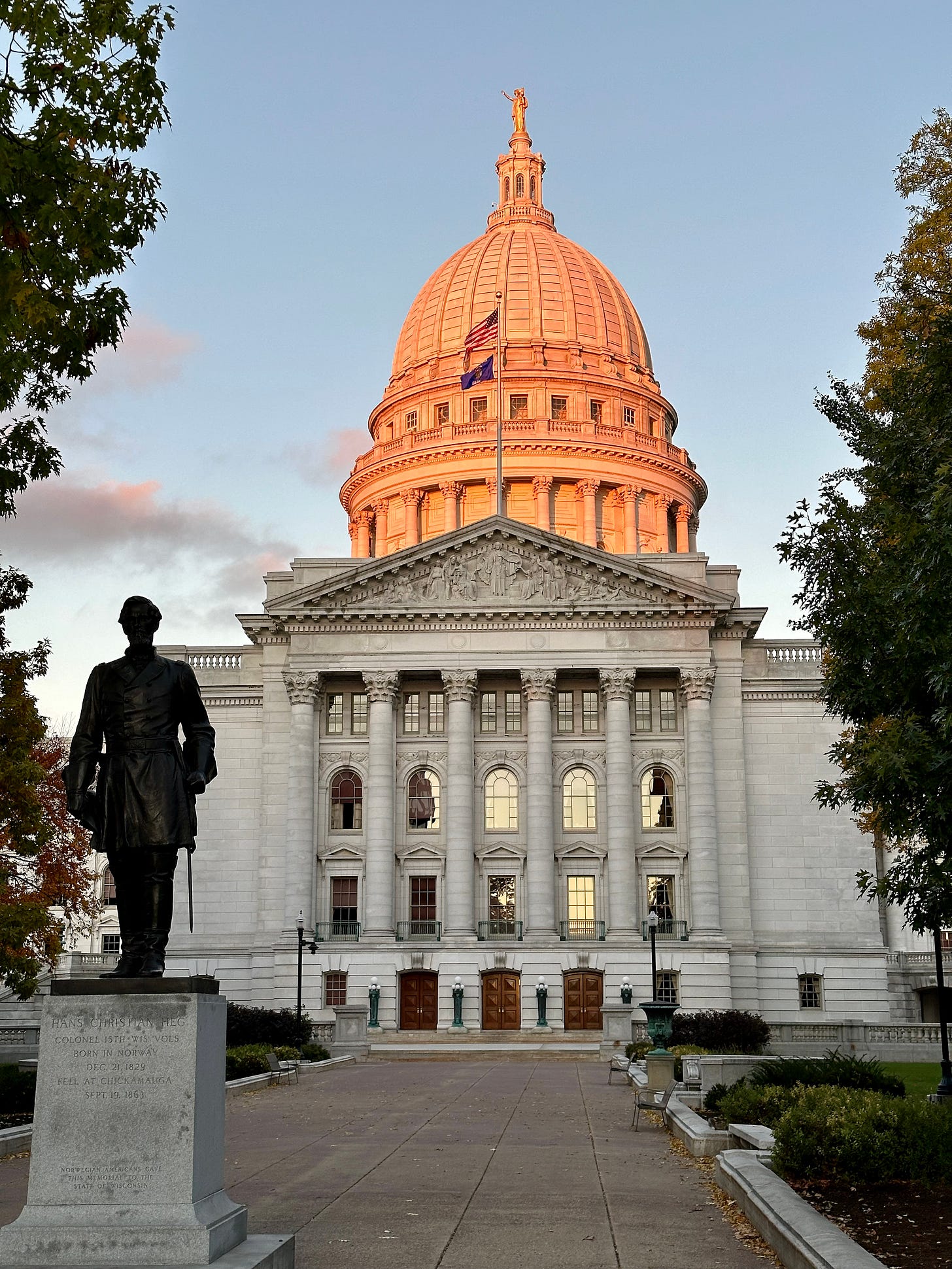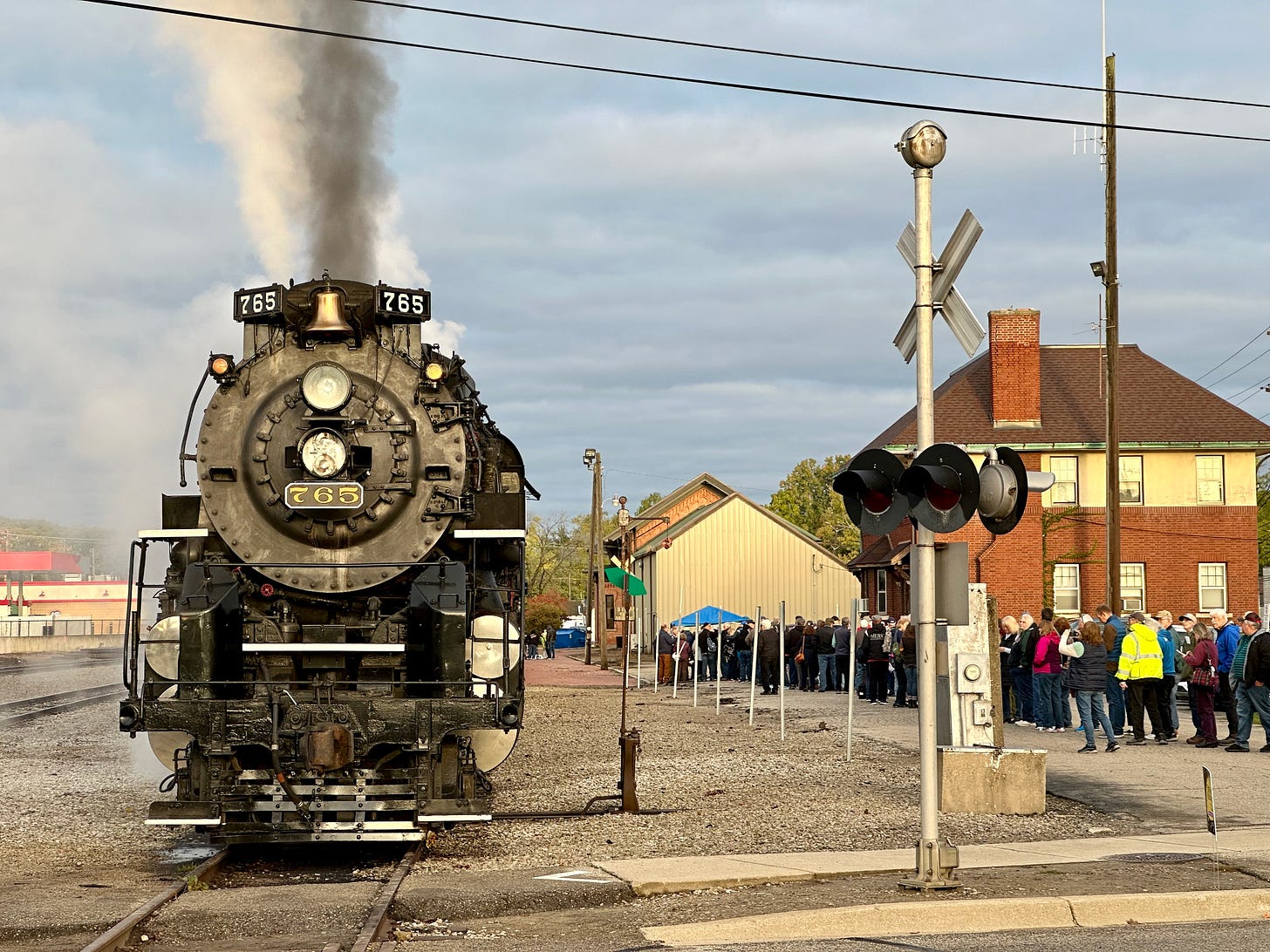Thoughts on the Front Porch Republic Annual Conference
"No one is obliged to partake in the spiritual follies of a society."
Dear Boss,
I spent the weekend in Madison, WI, attending the annual conference of the Front Porch Republic. The Front Porch Republic – an online journal led by characters such as Jason Peters (my mostly venerable father-in-law), Mark Mitchell, Jeffrey Bilbro, and Jeff Polet – highlights life on the human scale and encourages individuals to consider their responsibility to the future. Their annual conference is a one-day affair. It featured lectures from pensive speakers and attendees who live at the oxymoronic juncture of “very online” fans of Wendell Berry. At its worst, the conference speakers exhorted you to throw away your smartphone and then subscribe to their Substack. At its best, it highlighted the inhumane tendencies of modern living and encouraged critical engagement with modern temptations in pursuit of person-to-person relations. Overall, it was a fantastic day full of thoughtful people.
Paul Kingsnorth was this year’s keynote speaker. Paul is a “[w]riter, Orthodox Christian, reactionary radical, aspiring beekeeper” and an Englishman-turned-Irishman whose writings focus on the unsustainable and inhumane conditions of modern living. His critiques may go slightly too far for my taste, but his is certainly a voice worth wrestling with.
Kingsnorth’s keynote address, “The Blizzard of the World,” began with a commentary on our modern obsession with the “new,” the avant-garde. We are a perpetually dissatisfied people. Our dissatisfaction drives us to pursue new modes of entertainment and new experiences at the expense of stability and tradition. According to Kingsnorth, “[t]he essence of modernity is the breakdown of form,” best symbolized by the atomic bomb. The atomic bomb requires destroying a most fundamental unit of matter, the atom. This destruction results in an enormous output of energy, but it also results in indiscriminate destruction.
In Kingsnorth’s telling, our obsession with creative destruction will inevitably result in a total societal collapse we eventually tear through the foundations of Western culture. Supposing that society does collapse, it will collapse from the inside and the collapse will work its way out. In the America’s case, our “inside” is found on the edges; New York, D.C., LA, and San Francisco will all collapse well before the sturdy communities of the Midwest and the Great Plains.
That may sound quite doomy and gloomy, but Kingsnorth sees a light at the end of the tunnel. If destruction must come, the restoration will follow. If the destruction begins at the center of society, the restoration will come from the fringes. For instance, when the Roman Empire failed, Western Society was kept alive by monasteries on the fringes of society. These monasteries preserved the culture, thought, and texts that allowed the West to survive an era of savagery. This idea, restoration from the fringes, is the idea that finally connects this conference to Hillsdale.
By nearly any measure, Hillsdale is a city on the fringe. Geographically, not only are we removed from the main veins of transportation, we also are on the edge of the American “center”, the Eastern seaboard. Politically, Hillsdale is a red dot in a blue state. Educationally, Hillsdale is home to what is likely the most idiosyncratic college in America. Economically, Hillsdale has largely been left out of the economic growth occurring in the controlling heights of America. Religiously, Hillsdale keeps the faith while other communities falter. According to Kingsnorth’s schema, Hillsdale is set to be a focal point of an American restoration.
I don’t know if American society is genuinely on the verge of collapse. I like to think that it is not. Modern events and trends certainly seem dark, but I don’t know if that is because we are more aware of national dysfunction today or if we are truly more dysfunctional. But I do know that Hillsdale is set for a restoration. I also know Hillsdale can be a source of hope for Americans seeking renewal. If Hillsdale can get back on its feet after decades of decline, then Americans everywhere will know that restoration is not only possible, but also probable as more people look to settle down and better their local communities rather than “change the world.”
According to my mostly venerable father-in-law, our imagination is “not whimsical, but fatal.” The way we imagine ourselves and our future isn’t arbitrary, it is decisive. If we imagine ourselves to be a community that time has passed by, we will guarantee that future. Alternatively, we can properly imagine ourselves as a community that has experienced a temporary decline but is now set up for growth and rejuvenation. That’s the future I envision for Hillsdale. I hope you imagine it, too.






Imagination is not whimsical but fatal. Yes. Absolutely. Great call to guard our thinking and to cultivate an imagination for the good. Appreciate the assessment of Hillsdale being on the fringe. That's an empowering perception. (Emerson may have used the word "perception" in that statement, and wondering if the words are interchangeable in the sense they are being used here.)
It was a great time in Madison with you, Luke. I'm genuinely excited for and believe in the future of Hillsdale!